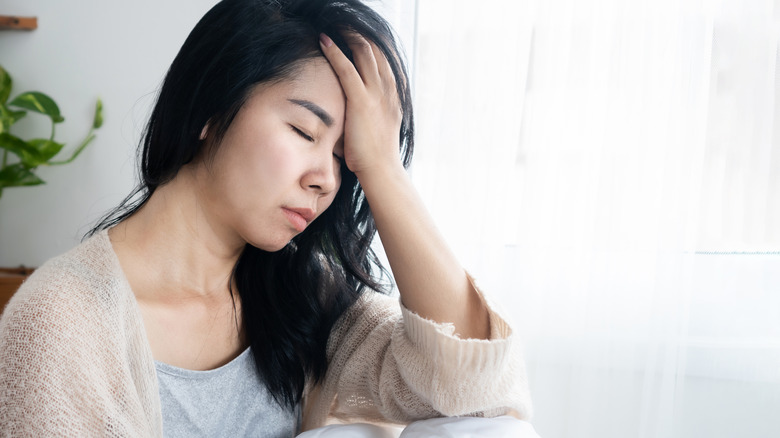Side Effects You May Experience After Taking The Morning-After Pill
It can get really confusing when you try to separate science-backed knowledge from hearsay on the internet, especially in the area of reproductive and sexual health. Morning-after pills have had their share of fame in this regard. From people claiming that the pill would "ravage" women's bodies, to the belief that the pill is only effective if taken the morning right after unprotected sex, there is no shortage of myths (per Byrdie and Self). However, a quick look at the history of the morning-after pill would tell you about the interesting (and controversial) journey this emergency contraception method has taken since its first recorded use in the mid-1960s, per Verywell Health.
How does a morning-after pill work? The most basic explanation is that the pill prevents ovulation, according to Cleveland Clinic. There are two main types of morning-after pills: Ella and Plan B, the main difference between them being how long the pill is effective for and whether or not you require a prescription to purchase one, reports Planned Parenthood. You can do your research on the merits of each and decide which morning-after pill is right for you.
The next question related to the pill is about its side effects. Does the morning-after pill affect fertility? Does it cause irreparable damage to your body? Let's find out.
These are the most common side effects
The side effects from taking a morning-after pill can vary from some physical discomfort to nothing at all, as consultant obstetrician and gynecologist Michelle Metz tells Byrdie. "Some women experience nausea, vomiting, or headache while others experience no side effects at all," explains Metz. Your next period might either be delayed or come early and might be heavier than usual, per Cleveland Clinic. There might also be dizziness, tenderness in the breast region, exhaustion, spotting between menstruation, and pain in the lower belly (via Mayo Clinic).
Making sure you consume the pill with a meal or enlisting the aid of anti-nausea drugs are some things you can do to curb the feeling of being sick, suggests Yale University. Painkillers should do the trick when it comes to stomach cramps and headaches (via Med Shadow Foundation).
Although the morning-after pill should not be confused with normal birth control methods like condoms and IUDs, there is no harm in using this emergency contraceptive method whenever you feel the need to, according to Denmark-based gynecologist Charlotte Wilken-Jensen from Amager and Hvidovre Hospital. "Every formula of the morning-after pill advises you to take it only once every cycle, but really, you can safely take it any time you have unprotected intercourse. Of course, if you take it more than once, your risks of side effects increase," she tells Vice.
Do you need to see a doctor after taking a morning-after pill?
There are certain occasions when you should either take a pregnancy test or see a healthcare professional after taking a morning-after pill. Consultant obstetrician and gynecologist Michelle Metz tells Byrdie that it's a good idea to take a pregnancy test if you completely miss your next period. In addition, Cleveland Clinic recommends reaching out to your doctor so you can work together on future steps. You should also be seeking the advice of a medical practitioner if you throw up a couple of hours after consuming the pill or if you develop really bad abdominal cramping three to five weeks afterward (via Mayo Clinic).
The morning-after pill is a safe form of emergency contraception, and while you don't have to take it the very next morning after unprotected sex for it to work, the sooner you take it, the better its efficacy. Metz says the pill is most effective when taken within 24 hours of unprotected sexual contact, but you can take it up to 72 hours later and it should still work. There are also weight considerations that play a role in the efficacy of the morning-after pill. Taking the morning-after pill does not cause harm to a woman's ability to conceive either, per Planned Parenthood.
While the common side effects (if you do experience them) are not pleasant in any way, they are usually mild and manageable on your own.


